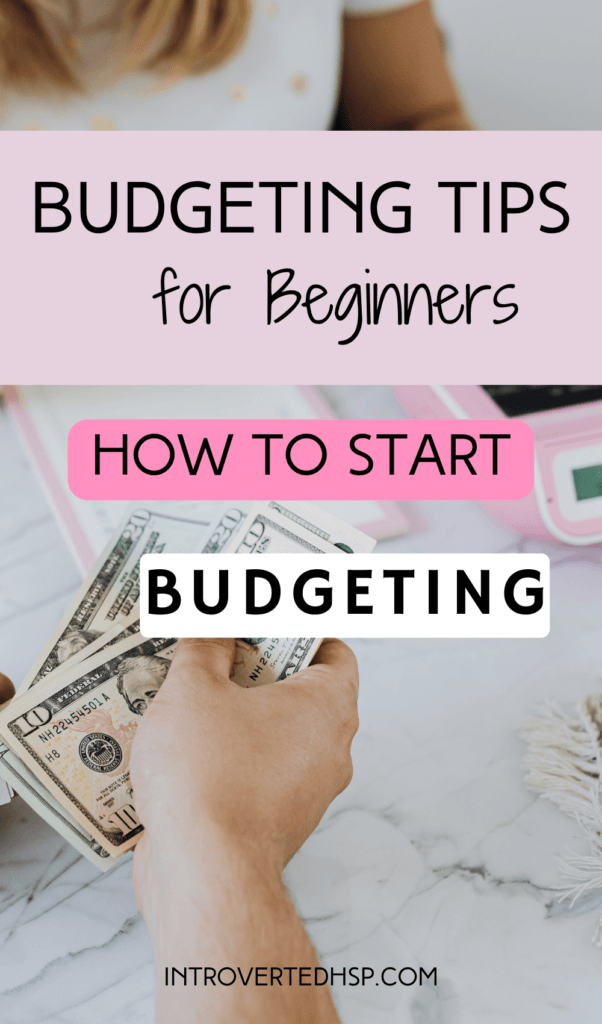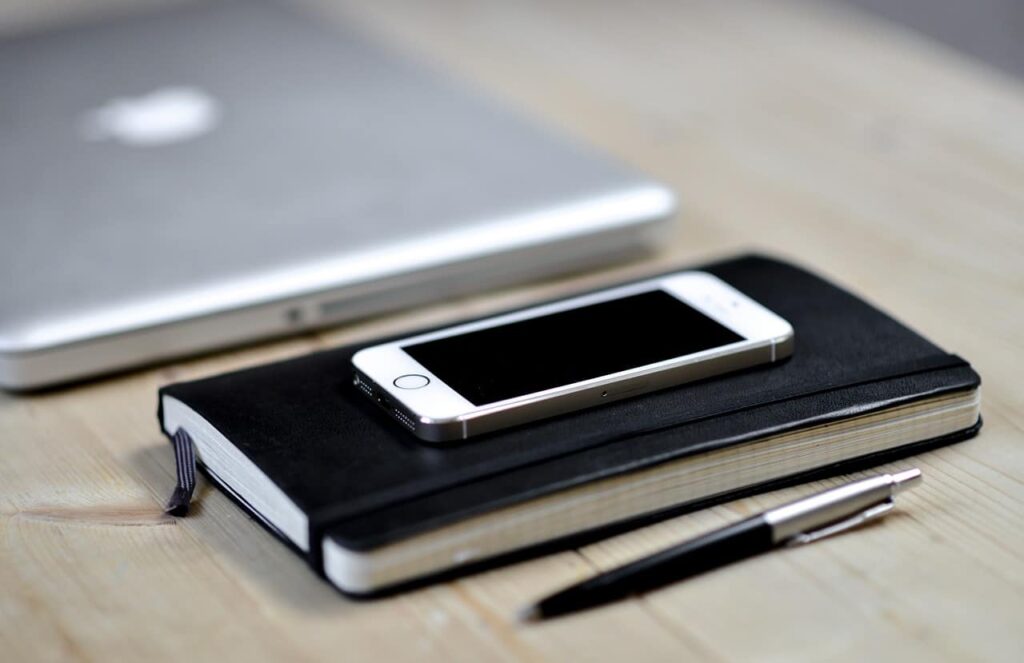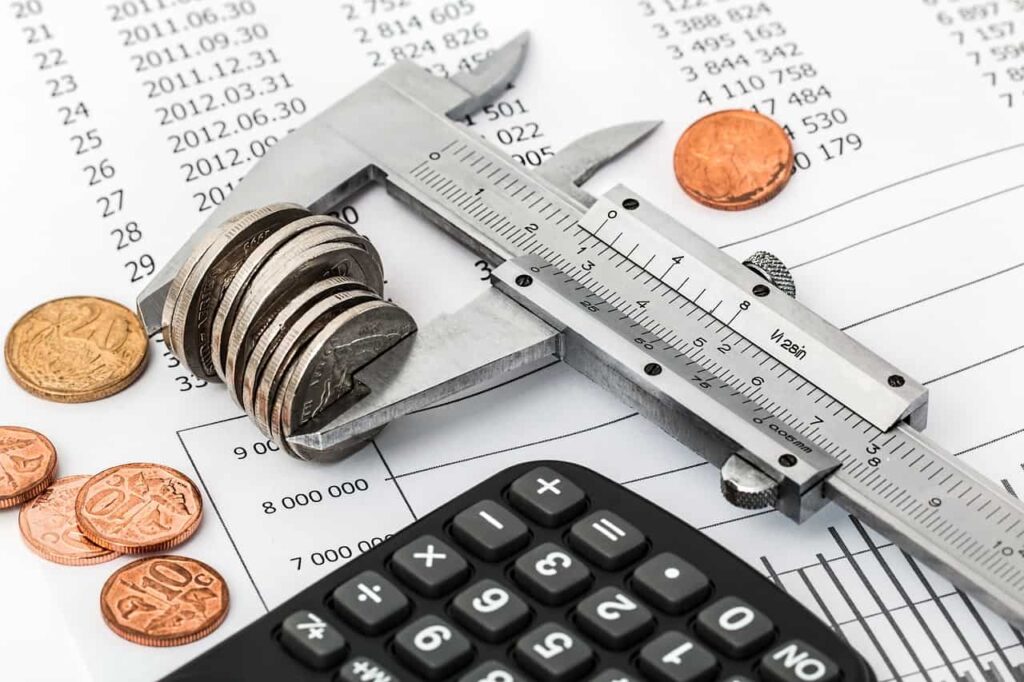Budgeting tips for beginners. How do you start budgeting as a complete beginner?
Is it really that boring or difficult? Will it help you save more money? Is it worth it?
A lot of questions, but I think yes, it is worth it! Give it a shot!

This post may contain affiliate links, which means if you make a purchase through these links, I may receive a small commission at no extra cost to you. As an Amazon Associate I earn from qualifying purchases. Please read my disclosure for more info.
My First Steps into Personal Budgeting
I started budgeting in the summer of 2022 because that was when I first started making some real money. Not a lot of money, but more than what I was making while working as a student for sure!
Because I just got out of college, I was still living at my parents’ house, trying to save as much money as possible! However, I do pay them every month, just like I would pay rent (only cheaper).
Budgeting is a weekly or monthly habit you should learn if you want more control over your financial situation. By learning how to budget, you can save a lot of money because you will see where you are losing it all without really knowing it.
These budgeting tips for beginners would have been really handy for me to have from the start. Hopefully, they will help you greatly!
If you like budgeting tips for beginners, you might also like: 7 Habits of Powerful Women Who Save a Lot of Money

Budgeting tips for beginners, step-by-step explanation
1. Find your why and define your financial goals
What is your reason for wanting to start a budget? ‘I want to save more money’ isn’t good enough to keep you motivated to be consistent with budgeting for most people.
Some examples of financial goals:
- Emergency fund
- House deposit
- Traveling
- Retirement (less fun but somewhat necessary)
- Investment portfolio
- Paying off debt
- Paying off student loans
And then why do you want to achieve those specific goals? What is your motivation to start budgeting and save more money?

2. Where to budget?
Start with choosing your way of tracking everything.
Do you like keeping things in an Excel spreadsheet or is a paper notebook more your thing? There are also a lot of budgeting apps these days.
I love paper notebooks but for practicality, I think that an Excel spreadsheet is easier and clearer. But starting in a notebook is fine as some people love to write things down (myself included).
There are plenty of cute budget planners on Amazon. The Clever Fox Budget Planner looks complete, easy to use, and beautiful at the same time. Another cute one that is a lot cheaper is this budget planner from Taja.
I am using a free spreadsheet (number 3 from the link I share below) that I found online and so far, I like it a lot. It’s an annual tracker which I like because it gives you a clear vision of the year without losing all of the details.
3. When to budget?
Pick a moment when you want to do your budget. Do you like doing it every week, or is doing a monthly budget more achievable for you? Make it a routine like brushing your teeth.
My recommendation would be to take a little moment every week to keep up with your expenses. If you wait until the end of the month, all your expenses may have piled up and it can be overwhelming.
I try to fill in my budget planner as soon as I can so when I go shopping or spend some money during the day, I fill in my planner later that same day. Or at least that’s what I try to do at this moment in my life. Budgeting is an ever-changing process to fit your daily life. Adjust it as you need.

4. Two Main Things to Track – Your Income + Your Expenses
Your income is everything that you earn per month. Everything from your day job, extra side hustles, passive income, or even rental or dividend income.
Your expenses are more diversified (probably) and take longer to track.
Tracking your income
This one is very easy if you have one main income stream, your day job. Just fill it out when you get your paycheck and you’re done. I calculate my net income so I don’t use an expense tab for my taxes. In my country, it is kind of depressing how much we have to pay for taxes so I don’t want to see my gross income too much.
You can fill in your gross income and make sure that you fill in your taxes as an expense every month.
When you have multiple income streams you should make sure that you include them all.
It is more difficult to make a budget if you have an income that fluctuates like freelancers for example. You can calculate an average of your earnings from the last 3-6 months and take that as your monthly budget income. Or you can try to make a budget based on the months with the lowest income, this way, you can save a lot more when you have higher income months!
Tracking your expenses
When you only use your card to pay for things, it’s easy to check your weekly or monthly spending using your bank account app. If you use cash, make sure you keep your receipts to do the tracking!
Write everything down in your planner, app, or Excel sheet. The tracker I use has a lot of different categories and you can add new lines for categories you need in your daily life. At the bottom of the page of the tracker, you can see if your balance each month is in red or green. This way you can see if you are saving money or spending more than you earn.
You should always try to keep your income higher than your expenses to save money!

Saving money by analyzing your spending habits
When you fill everything out, you can start looking for patterns of spending habits that might not be in your favor. It is best to do this for a couple of months to get a good data set of your spending habits.
Now that you know where your money is leaking away, you can actively choose to do something about it!
Necessary expenses: fixed + variable
Figure out what your necessary expenses are for every month. Necessary expenses are those you need to maintain your life.
There are two types of necessary expenses, fixed expenses, and variable expenses. When you track your expenses for a couple of months, you will be able to see what your monthly fixed expenses are.
Fixed expenses
A few examples of fixed monthly expenses:
- Rent/mortgage
- Utilities
- Phone bill
- Car payment and insurance
Some of these expenses only come one time a year, so you should calculate how much you have to pay for them every month by dividing the yearly bill by 12. This way, you can budget for bigger expenses every month without being surprised when some bills arrive.
Variable expenses
There are also variable expenses you need to stay alive, like groceries, healthcare, car maintenance, repairs, etc.
To come up with a budget for these categories, you can calculate an average by adding up 3-6 months and dividing them by the number you choose. This way you have your monthly estimated budget for groceries, healthcare, etc.
You might also like: How to Save More Money on Groceries: 15 Tips for Spending Less
Your total necessary spending budget
To calculate your necessary spending budget, just add up all your necessary spending. The hard fixed numbers but also the monthly estimates or averages. The fixed and the variable expenses.
This is your starting point, you need at least this amount of money to get by every month.
5. Thinking about your financial goals

This step belongs to good budgeting tips for beginners as this drives and motivates you to keep going.
It’s time to start thinking about the things that you value spending your money on and your bigger financial goals.
Some financial goals I have and I think are great to have for everyone as I mentioned above:
- Emergency fund
- House deposit
- Traveling
- Retirement (less fun but somewhat necessary)
- Investment portfolio
Instead of hoping that there will be money left over at the end of each month, set aside a part of your income for your financial goals so you will reach them!
You have to determine how much money you can spend on each of your financial goals every month. It can help to figure out how much money in total you need to reach your goal, say for example 10k for an emergency fund.
How will you get to your 10k emergency fund? Simply set a deadline, maybe 2 years or 24 months from now, then divide your total savings goal of 10k by the number of months and you will see you have to save 417 dollars or euros each month. Then check if this amount of money seems achievable for your situation.
To not lose your motivation your goals must be achievable. My advice is to start small so you get some accomplishments at the start of your budgeting journey and if you feel like you could make them bigger, go for it! You can reevaluate it whenever you need and do some re-calculations when necessary.
Try to treat your financial goals savings as fixed expenses to prioritize them.
6. Fun things to include in your spending plan

This section covers more of your wants than your needs.
But what is life without a little fun? How do you want your life to be?
How much money is there left over after all the previous steps of necessary spending and financial goal planning?
In this step, you will have to create some categories on which you want to spend your money. Then you should choose how much money you want to spend monthly on each of them. Take a look at your previous months to give yourself an idea of what you spend in each category or make them up and adjust them as you go.
Examples are: dining out, buying clothes, gifts, personal care, subscriptions to streaming sites of gym memberships, etc.
Budgeting tips for beginners: cut yourself some slack but not too much. If you don’t allow yourself to spend anything on yourself, you probably won’t stick with it for a very long time. You mustn’t only save up for later because you live right now.
ADD IT ALL UP!
When you add up everything: necessary spending (fixed/variable) + financial goals + fun things = your monthly spending budget.
REMINDER: You should always try to keep your income higher than your expenses to save money! Unless your saving goals are integrated into your expenses, then you can be left with no money but still having saved some. This is called zero-based budgeting when the balance at the end of each month hits zero.

If you like budgeting tips for beginners, you might also like: How to use the 50/30/20 budgeting method for budgeting success
7. Adjust as you go
When you are budgeting and tracking everything that comes in and goes out every month, it will show you if you need to adjust your budget to balance it out.
Remember to prioritize your financial goals to save your money instead of spending it all!
If you have to adjust something, try to adjust your variable expenses as they are easiest to adjust.
Cut back on things like fun spending or maybe on groceries if you always pick A-brands or the most expensive food.
Maybe you think, hey I don’t want to cut back on my fun spending! I get it! Everyone wants to have fun. Try being creative and look up more budget-friendly alternatives or decide to lower your financial goals a bit (only a bit!) to enjoy today more.
It’s your life, and your financial goals will help you become more financially free so I think it is worth some sacrifices in the present. Again I said some, you should still be able to have fun and enjoy your life!
Conclusion Budgeting Tips for Beginners:
Budgeting is so important if you want to take control of your financial life and your future.
It’s not that difficult, but the start can be a little overwhelming.
If you make it a routine, it will get easier and easier every month and you may even start to like it. You can go from budgeting tips for beginners to budgeting like a pro!
Seeing your financial goals being completed thanks to keeping a budget is so fulfilling! You got this!
You can find even more budgeting tips for beginners on this blog!
